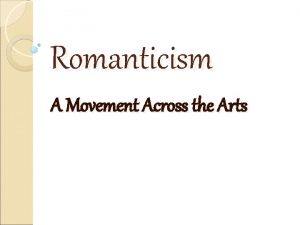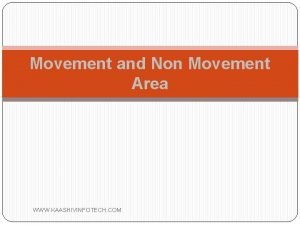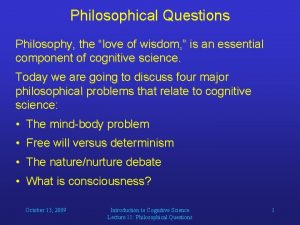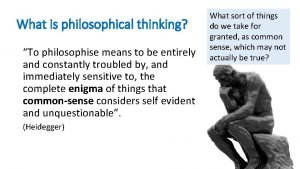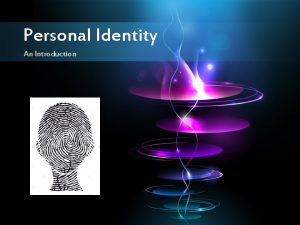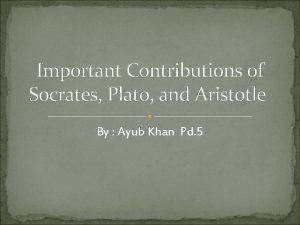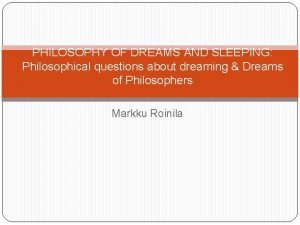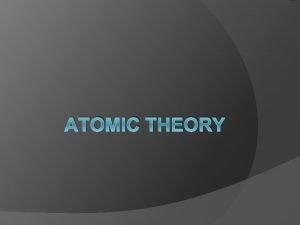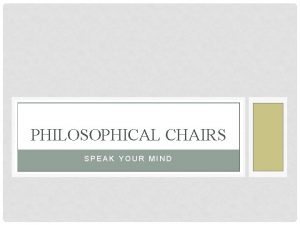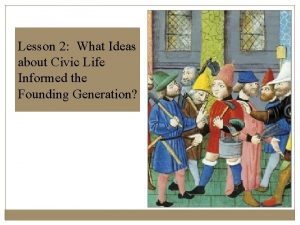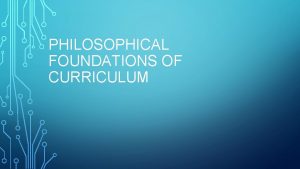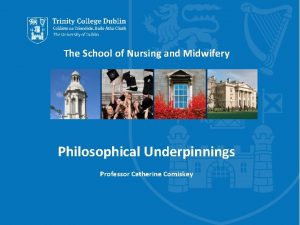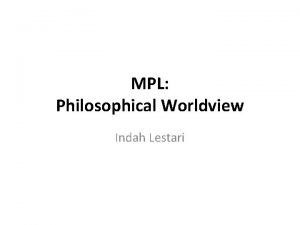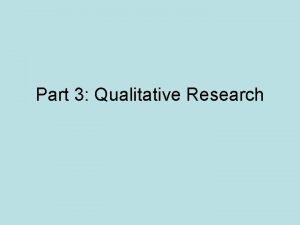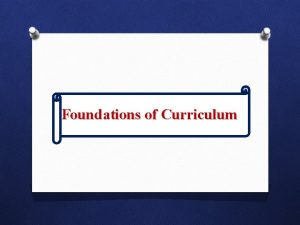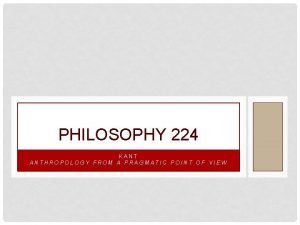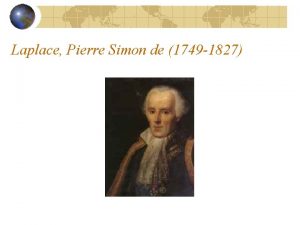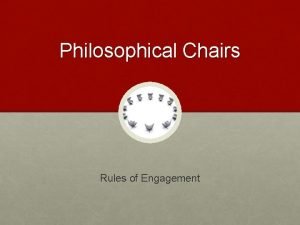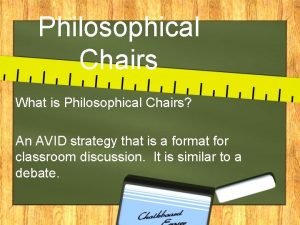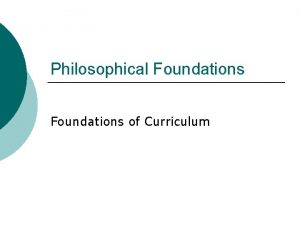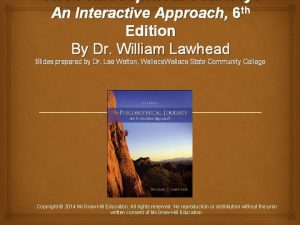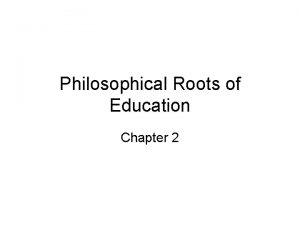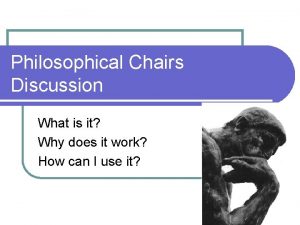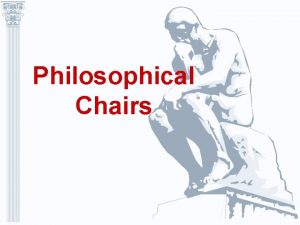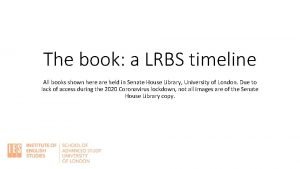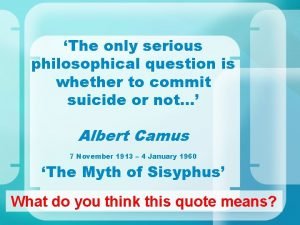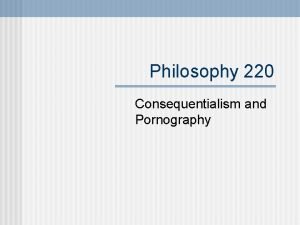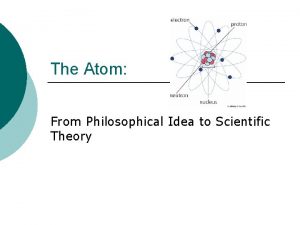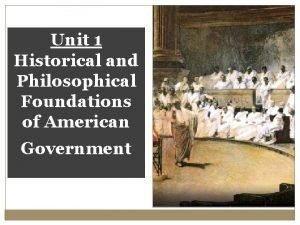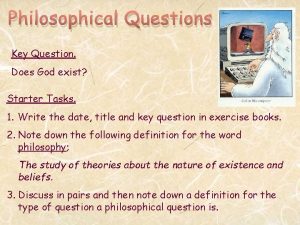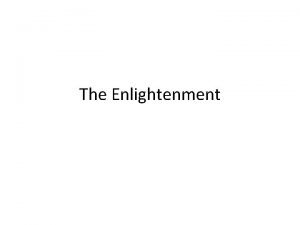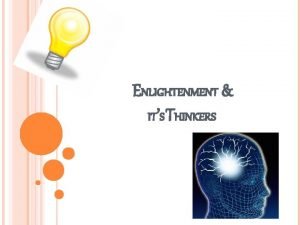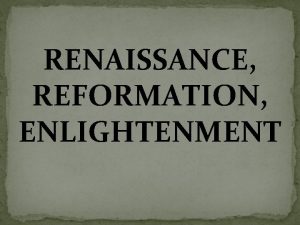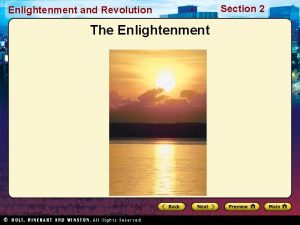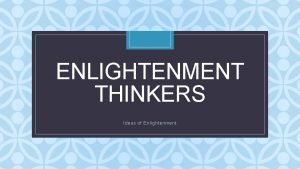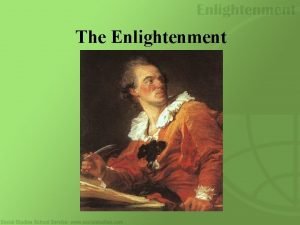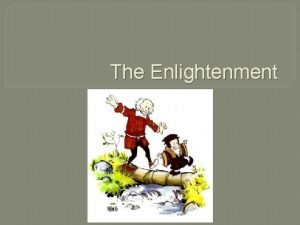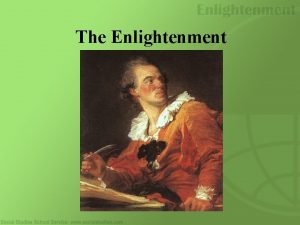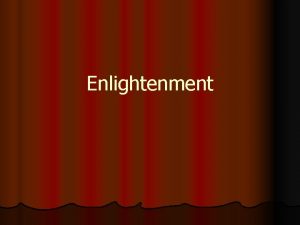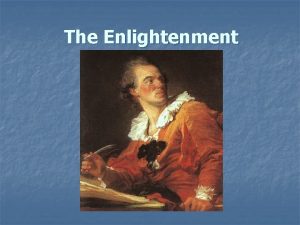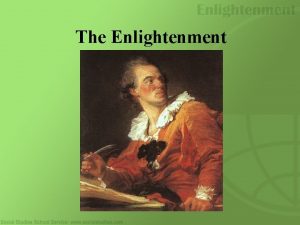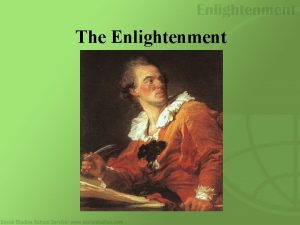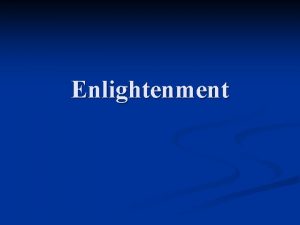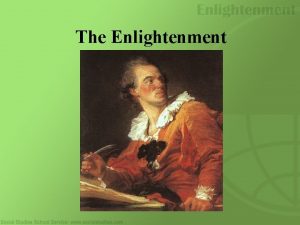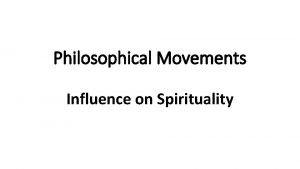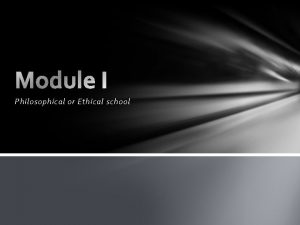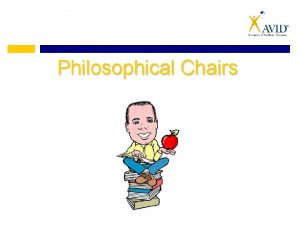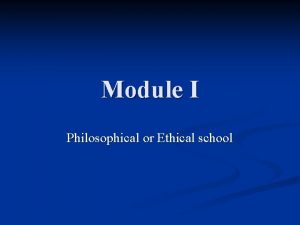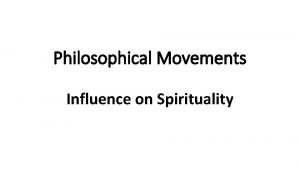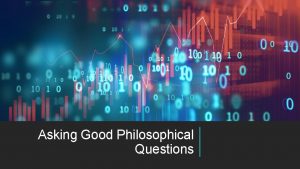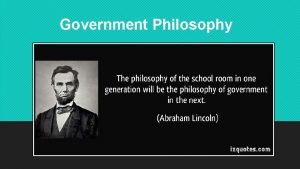The Enlightenment The Enlightenment Philosophical movement in the





































- Slides: 37

The Enlightenment

The Enlightenment • Philosophical movement in the 17 th century in Europe • Emphasis on Science, logic and reason, moving away from tradition and superstition

Enlightenment: Origins

Scientific Revolution • Inventions of new scientific instruments allowed people to analyze the world in a new way – Telescope (1609) – Microscope (1590)

Enlightenment Terms • State of Nature: time before human civilization • Virtue: behavior showing high moral standards – Self sacrifice for the good of the state – Ex. Horatio at the Bridge

Tools of the Enlightenment • 1. Scientific Method: process to answer questions – Question – Research – Hypothesis – Experiment – Analysis – Conclusion • 2. Logic: using reasoning to answer a question

• “I think, therefore I am” – Rene Descartes

Enlightenment and God • Theists: Traditional belief in God and religion • Deism: Belief in God in science without religion influencing the world • Pantheism: Belief in God through nature • Atheism: NO GOD, ONLY SCIENCE!!!!

Royal Academy of Sciences, Paris

Natural History Collections James Petiver’s Beetles (London apothecary)

Private Collections The Origins of Modern Museums.

A Parisian Salon

The Salonnieres Madame Geoffrin (1699 -1777) Mademoiselle Julie de Lespinasse (1732*-1776) Madame Suzanne Necker (1739 -1794)

Centers of the Enlightenment

The Characteristics of the Enlightenment 1. Rationalism reason is the arbiter of all things. 2. Cosmology a new concept of man, his existence on earth, & the place of the earth in the universe. 3. Secularism application of the methods of science to religion & philosophy.

The Characteristics of the Enlightenment 4. Scientific Method § Mathematical analysis § Experimentation § Inductive reasoning. 5. Utilitarianism the greatest good for the greatest number. 6. Tolerance No opinion is worth burning your neighbor for.

The Characteristics of the Enlightenment 7. Optimism & Self-Confidence § The belief that man is intrinsically good. § The belief in social progress. 8. Freedom § Of thought and expression. § Bring liberty to all men (modern battle against absolutism). 9. Education of the Masses

The Characteristics of the Enlightenment 10. Legal Reforms § Justice, kindness, and charity no torture or indiscriminant incarceration. § Due process of law. 11. Constitutionalism § Written constitutions listing citizens, rights. 12. Cosmopolitanism. § Being immersed and comfortable in other cultures

The “Great Debate” Reason & Logic erationalism eempiricism etolerance eskepticism e. Deism Traditions and Superstitions enostalgia for the past eorganized religions eirrationalism eemotionalism

Enlightenment Philosophers

Enlightenment Philosophers • • • Thomas Hobbes John Locke Montesquieu Roseau Voltaire (my favorite!) Adam Smith

Voltaire’s “Wisdom” (I) ► Every man is guilty of all the good he didn’t do. ► God is a comedian playing to an audience too afraid to laugh. ► If God did not exist, it would be necessary to invent him. ► It is dangerous to be right when the government is wrong. ► Love truth and pardon error.

Voltaire’s “Wisdom” (II) ► Judge of a man by his questions rather than by his answers. ► Men are equal; it is not birth, but virtue that makes the difference. ► Prejudice is opinion without judgment. ► The way to become boring is to say everything. ► I may not agree with what you have to say, but I will defend to the death your right to say it.

Enlightened Despotism

Frederick the Great of Prussia • Prussia: German state • Reformed military – Rigid discipline – Promoted based on merit • “First servant of the State” • Expanded Prussia • Most powerful German state

Prussia map

Catherine the Great (r. 1762 -1796) ► German Princess Sophie Friederike Auguste of Anhalt-Zerbst. ► 1729 -– 1796.

Catherine the Great • Reduced power of clergy • Tried to write a Constitution for Russia

Enlightenment Philosophers • John Locke • Baron de Montesquieu • Voltaire

John Locke (1632 -1704) • Humans are inherently good • Virtue can be learned • Human beings need to be free – Should be ruled through conviction, not fear • Social Contract – Life, Liberty, Property • Divine Right of Kings total nonsense

Baron de Montesquieu • Books written: Spirit of the Laws, Persian Letters • 3 Types of Government: – Monarchy – Republic – Despotism • Separation of Powers

Voltaire’s “Wisdom” (I) ► Every man is guilty of all the good he didn’t do. ► God is a comedian playing to an audience too afraid to laugh. ► If God did not exist, it would be necessary to invent him. ► It is dangerous to be right when the government is wrong. ► Love truth and pardon error.

Voltaire’s “Wisdom” (II) ► Judge of a man by his questions rather than by his answers. ► Men are equal; it is not birth, but virtue that makes the difference. ► Prejudice is opinion without judgment. ► The way to become boring is to say everything. ► I may not agree with what you have to say, but I will defend to the death your right to say it.




 Philosophical and artistic movement
Philosophical and artistic movement Movement and non-movement area
Movement and non-movement area Axial movement of the body examples
Axial movement of the body examples Philosophical questions on love
Philosophical questions on love Philosophical thinking means
Philosophical thinking means Philosophical questions about identity
Philosophical questions about identity Contribution of socrates in philosophy
Contribution of socrates in philosophy What was descartes excuse for sleeping late
What was descartes excuse for sleeping late The atom from philosophical idea to scientific theory
The atom from philosophical idea to scientific theory Philosophical chairs
Philosophical chairs What philosophical ideas informed the founding generation?
What philosophical ideas informed the founding generation? Philosophical foundation of curriculum
Philosophical foundation of curriculum Philosophical underpinnings of nursing
Philosophical underpinnings of nursing Philosophical worldview in research
Philosophical worldview in research Sampling in qualitative research
Sampling in qualitative research Foundations of curriculum
Foundations of curriculum Anthropology from a pragmatic point of view
Anthropology from a pragmatic point of view Central limit theorem formula
Central limit theorem formula Philosophical chairs rules
Philosophical chairs rules Philosophical chairs
Philosophical chairs Philosophical chairs sentence starters
Philosophical chairs sentence starters Idealism curriculum
Idealism curriculum Read the philosophical journey: an interactive approach
Read the philosophical journey: an interactive approach Ridge relationship classification
Ridge relationship classification Branches of philosophy
Branches of philosophy Philosophical epq questions
Philosophical epq questions Philosophical chairs questions
Philosophical chairs questions Philosophical chairs topics 2020
Philosophical chairs topics 2020 Philosophical transactions
Philosophical transactions The only serious philosophical question
The only serious philosophical question Philosophical ethics
Philosophical ethics The atom from philosophical idea to scientific theory
The atom from philosophical idea to scientific theory Philosophical foundations of the american revolution
Philosophical foundations of the american revolution Philosophical questions
Philosophical questions Từ ngữ thể hiện lòng nhân hậu
Từ ngữ thể hiện lòng nhân hậu Bổ thể
Bổ thể Tư thế ngồi viết
Tư thế ngồi viết Thẻ vin
Thẻ vin
